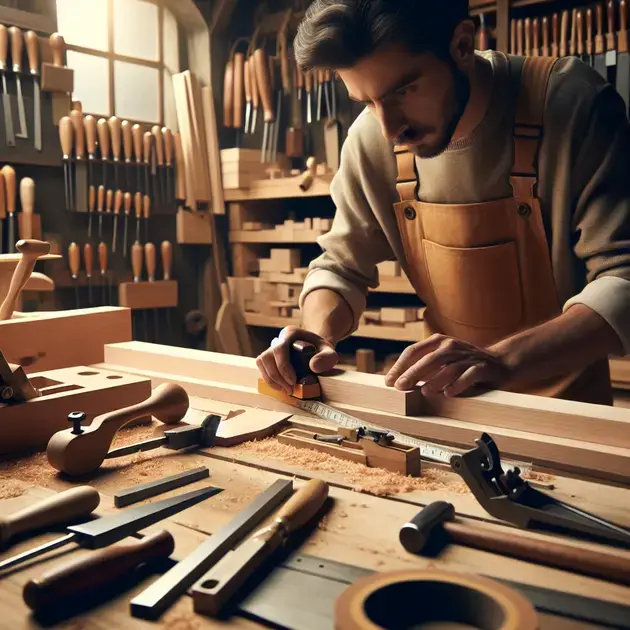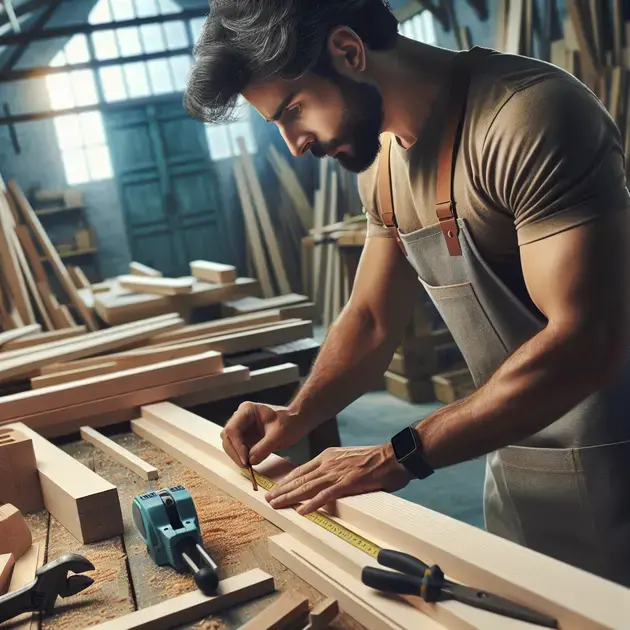Are you a beginner looking to venture into the world of woodworking? Crafting stunning woodworking projects for beginners can be a rewarding and fulfilling experience. With the right guidance and tools, you can unleash your creativity and create beautiful pieces to cherish for a lifetime.
From simple DIY projects to intricate designs, woodworking offers a wide range of possibilities for beginners to explore. Whether you’re interested in building furniture, home decor items, or small crafts, there’s no shortage of inspiration and resources available to help you get started on your woodworking journey.

Crafting Stunning Woodworking Projects for Beginners: A Step-by-Step Guide
Woodworking can be a rewarding hobby for beginners, offering the satisfaction of creating something with your own hands. To start crafting stunning woodworking projects, follow this step-by-step guide:
1. Choose a Project:
Begin by selecting a simple project that matches your skill level. Websites like Wood Magazine offer free project plans for beginners, such as a basic shelf or a small stool.
2. Gather Materials:
Once you have chosen a project, gather all the necessary materials and tools. You can find a list of materials required for each project on woodworking websites like Family Handyman.
3. Prepare Your Workspace:
Set up a dedicated workspace in your garage or backyard for woodworking. Ensure it is well-ventilated, well-lit, and equipped with a sturdy workbench and essential tools like a sawhorse and clamps.
4. Measure and Cut:
Follow the project plan carefully, measure your wood accurately, and use a saw to make precise cuts. Apps like “Handy Carpenter” can help you with accurate measurements and angles.
5. Assemble and Finish:
Assemble your project according to the instructions, using tools like a hammer, screwdriver, and wood glue. Finally, sand your creation for a smooth finish and apply a coat of wood varnish or paint.
Essential Tools Every Beginner Woodworker Should Have
Having the right tools is essential for any woodworking project. Here are the must-have tools for beginners:
1. Tape Measure:
A good quality tape measure is essential for accurate measurements. Apps like “My Measures & Dimensions” can also help you keep track of your measurements digitally.
2. Hammer:
A basic hammer is necessary for driving nails and assembling wooden pieces. Look for a hammer with a comfortable grip and solid construction.
3. Screwdriver Set:
A set of screwdrivers in various sizes will come in handy for assembling furniture or tightening screws. Apps like “iFixit” provide guides on using different types of screwdrivers.
4. Saw:
A handsaw or a power saw is essential for cutting wood. Websites like The Spruce Crafts offer guides on choosing the right saw for your woodworking projects.
5. Clamps:
Clamps are essential for holding pieces of wood together securely while glueing or assembling. Apps like “Bessey Tools” provide information on different types of clamps and their uses.
Tips and Tricks for Perfecting Your Woodworking Skills
Improving your woodworking skills takes practice and patience. Here are some tips to help you perfect your craft:
1. Practice Makes Perfect:
Regular practice is key to improving your woodworking skills. Start with simple projects and gradually move on to more complex ones to hone your abilities.
2. Learn from Experts:
Attend woodworking classes or workshops to learn from experienced woodworkers. Websites like Popular Woodworking offer online courses and tutorials for beginners.
3. Safety First:
Always prioritize safety in your workshop. Wear protective gear like safety goggles and gloves, and read the safety instructions for all tools and equipment.
4. Experiment with Different Woods:
Try working with various types of wood to understand their properties and characteristics. Experimenting with different woods will expand your skillset and knowledge.
5. Join a Woodworking Community:
Joining a woodworking community or forum can provide valuable insights and feedback on your projects. Websites like LumberJocks are great platforms to connect with other woodworkers.

**Developing Essential Skills for Woodworking Success**
Understanding the Basics
Before diving into more advanced techniques, it is crucial for any aspiring woodworker to develop a strong foundation in the basics of woodworking. This includes learning about different types of wood, essential tools, safety precautions, and basic woodworking principles. By mastering these foundational skills, woodworkers can ensure the quality and precision of their future projects.
Practice Makes Perfect
One of the key aspects of developing essential skills for woodworking success is consistent practice. Like any craft or skill, woodworking requires time and dedication to improve. By regularly practicing different techniques, honing woodworking skills, and working on various projects, woodworkers can further develop their abilities and enhance their craftsmanship.
Seeking Guidance and Mentorship
Another effective way to develop essential skills for woodworking success is by seeking guidance and mentorship from experienced woodworkers. Learning from those who have extensive knowledge and expertise in the craft can provide invaluable insights, tips, and techniques that can significantly improve one’s woodworking skills and overall success in the field.
Embracing Challenges and Learning Opportunities
Woodworking is a constantly evolving craft, and there will always be new challenges and learning opportunities to embrace. By being open to trying new techniques, experimenting with different woodworking styles, and tackling more complex projects, woodworkers can push their skills to new heights and continue growing and developing in their craft.
Investing in Quality Tools and Materials
Lastly, a crucial aspect of developing essential skills for woodworking success is investing in quality tools and materials. Working with high-quality tools not only enhances the efficiency and precision of woodworking projects but also contributes to the overall craftsmanship and quality of the final products. By using superior materials, woodworkers can create durable and visually appealing pieces that showcase their skills and dedication to the craft.
—
**Common Mistakes to Avoid as a Beginner Woodworker**
Skipping Safety Precautions
One common mistake that beginner woodworkers often make is skipping or neglecting safety precautions. Safety should always be a top priority in woodworking to prevent accidents and injuries. It is essential to wear appropriate safety gear, such as protective goggles and gloves, and follow safety guidelines when operating tools and machinery to ensure a safe and enjoyable woodworking experience.
Not Understanding Wood Characteristics
Another mistake novice woodworkers make is not fully understanding the characteristics of different types of wood. Each type of wood has unique properties, such as grain patterns, hardness, and durability, that can impact the overall outcome of a project. It is important for beginner woodworkers to familiarize themselves with various wood species and their characteristics to make informed decisions in their woodworking endeavors.
Rushing Through Projects
Beginner woodworkers may often feel eager to complete projects quickly and move on to the next one, leading to rushing through the woodworking process. This can result in errors, inaccuracies, and subpar craftsmanship. It is crucial for novice woodworkers to take their time, follow proper techniques, and pay attention to detail to ensure the quality and accuracy of their work.
Ignoring Tool Maintenance
Failure to properly maintain tools is another common mistake that beginner woodworkers should avoid. Tools that are not well-maintained can lead to inefficient performance, inaccurate cuts, and even safety hazards. It is essential to regularly clean, sharpen, and store tools properly to prolong their lifespan and ensure optimal functionality during woodworking projects.
Not Seeking Feedback and Improvement
Lastly, a mistake that beginner woodworkers often make is not seeking feedback from more experienced woodworkers or peers to improve their skills. Constructive criticism and feedback can help novice woodworkers identify areas for improvement, learn new techniques, and refine their woodworking abilities. It is essential for beginners to be open to feedback and continuously strive for growth and enhancement in their woodworking skills.
—
**Exploring Advanced Techniques in Woodworking**
Mastering Joinery and Techniques
As woodworkers progress in their craft, exploring advanced techniques such as intricate joinery becomes essential. Mastering different types of joints, such as dovetail, mortise and tenon, and box joints, allows woodworkers to create structurally sound and visually appealing connections in their projects. By honing their joinery skills, woodworkers can elevate the quality and complexity of their woodworking creations.
Experimenting with Inlay and Marquetry
Inlay and marquetry are advanced woodworking techniques that involve adding decorative elements and intricate designs to wood surfaces. By experimenting with inlay techniques, such as using various materials like metal or shell, and exploring marquetry patterns, woodworkers can create stunning visual effects and embellishments in their projects. These techniques add a unique artistic touch to woodworking pieces.
Mastering Fine Finishing and Detailing
Finishing and detailing are crucial aspects of woodworking that can significantly impact the overall appearance and quality of a project. Advanced woodworkers often focus on mastering fine finishing techniques, such as hand-rubbed finishes, French polishing, and distressing, to achieve a professional and polished look in their creations. Attention to detail in finishing enhances the beauty and durability of woodworking pieces.
Utilizing Advanced Woodworking Machinery
Advanced woodworkers often incorporate specialized woodworking machinery, such as CNC routers, band saws, and lathe machines, into their projects to achieve precision and efficiency in their work. By familiarizing themselves with advanced woodworking equipment and techniques, woodworkers can expand their creative possibilities and tackle more intricate and challenging woodworking projects with confidence.
Pushing Boundaries and Creativity
Exploring advanced techniques in woodworking also involves pushing the boundaries of creativity and craftsmanship. Advanced woodworkers are not afraid to experiment, take risks, and innovate in their projects to create unique and exceptional pieces. By challenging themselves to try new techniques and designs, woodworkers can continuously grow and evolve in their woodworking skills and artistic expression.
**
Conclusion
**
Developing essential skills for woodworking success requires a strong foundation in the basics, consistent practice, seeking guidance from experienced woodworkers, embracing challenges, and investing in quality tools and materials. Mastering the fundamentals of woodworking, understanding wood characteristics, avoiding common mistakes like rushing through projects and neglecting tool maintenance, and actively seeking feedback for improvement are crucial steps towards achieving woodworking proficiency.
As woodworkers progress, exploring advanced techniques such as intricate joinery, inlay, marquetry, fine finishing, and utilizing advanced woodworking machinery becomes essential. By mastering these advanced skills, woodworkers can create structurally sound, visually appealing, and artistically intricate woodworking projects. Pushing boundaries and embracing creativity in woodworking not only fosters continuous growth but also allows woodworkers to innovate and create exceptional pieces that showcase their craftsmanship.
In conclusion, woodworking is a craft that demands dedication, continuous learning, and a passion for creativity. By honing both fundamental and advanced skills, embracing challenges, and seeking inspiration from experienced mentors, woodworkers can elevate their craft and produce high-quality, aesthetically pleasing woodworking projects. Whether you are a beginner or an experienced woodworker, the journey of skill development and artistic expression in woodworking is both fulfilling and rewarding.